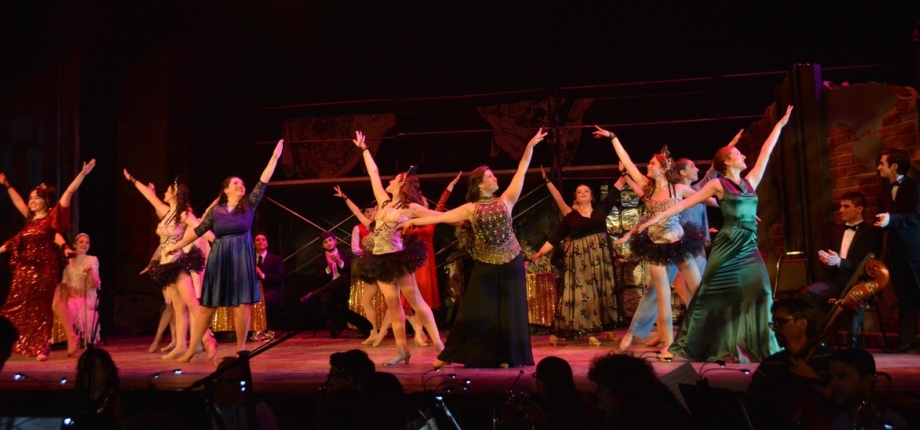Filichia Features: Young "Follies"

Filichia Features: Young "Follies"
You're a high-school director who's looking for your next musical. You decide to scour an alphabetical list of what's available. Your eyes go from Flowers for Algernon to Footloose without ever giving a thought to the musical that comes between: Follies.
Who can blame you? Follies centers on people in 40s and 50s. So how could can kids born in this millennium ever understand the problems of middle-agers -- and not contemporary ones, either? Follies takes place in 1971, which means that the central characters were born close to 100 years ago.
What's more, high school musicals tend to be happy-go-lucky. Although many secondary education directors try West Side Story, serious musicals don't often show up. And while there are plenty of joyous musical numbers in Follies (thank you, Stephen Sondheim!), the show does display two miserable marriages. Three spouses openly admit to adultery and a fourth is on the brink.
Yes, that's what I thought, too - until I attended Westfield (NJ) High School's spectacular production that showed teens can do it - well, at least the 46 that director Daniel Devlin and choreographer Samantha Simpson had at their disposal.
Think about the chorus members that populated 22 of Florenz Ziegfeld's revues - the prototype for Dimitri Weismann's Follies. Many of them weren't that much older than high schoolers. Doris Eaton Travis, in fact, was a mere 14 when she joined the troupe. So, Simpson's dozen or so young ladies didn't seem ridiculously out-of-place.
High school theater tends to attract girls, and here are 11 numbers in which the women are showcased. Not many musicals allow three featured actresses to be so singled out, thanks to "Broadway Baby," "Ah, Paree!" and "I'm Still Here" -- still the best song ever written out-of-town.
There's one duet for a boy and girl ("Rain on the Roof") and one for two girls ("One More Kiss"). Two other songs start out as solos and morph into ensemble numbers: Roscoe introduces those "Beautiful Girls" (still the best opening number of all) and Stella Deems brings back the memories of "Who's That Woman?" - the dance number she and the other Weismann Girls used to do. That, of course, is still the best production number ever staged, thanks to Michael Bennett, although Samantha Simpson rose to the occasion like a skyrocket.
While parvenus called Follies "an embarrassment of riches," let's instead say that there's plenty of wealth to share.
And let's face it: today's teens are far more sophisticated than they were in 1971, so James Goldman's book won't mystify them. Replicating those bitter feelings won't be as out of reach for them as a director might initially assume. There's a good chance that the kids you cast as the acrimonious Phyllis and Ben Stone and the hapless Buddy and Sally Plummer will have already had their own romances and breakups. They'll remember the ferocious fights they had with boyfriends or girlfriends with whom they once thought they'd be in love with forever and ever. One doesn't have to be middle-aged to have a heart broken by what seemed to be love.
Follies is a ghost story of a different kind and is scary in its own way. There's a full second cast of ghosts who represent the people our main characters used to be. They're mostly silent, so they provide a good opportunity to break in kids. For that matter, you can give the adult roles to your juniors and seniors and their young counterparts to the sophomores and freshmen. Ghost stories are meant to be scary, and Follies is also scary but in its own way. We see the panic and regret people have as they age and rue the roads they didn't take. Perhaps if kids are exposed to this danger at an early age they'll be careful to not make many of these mistakes.
References to the Depression, the W.P.A., Gandhi, W.P.A, Herbert and J. Edgar Hoover, Proust and Pound give an opportunity for a director to dispense a casual history lesson during rehearsals. Yes, Follies has much to teach - which should happen in high schools, shouldn't it?
You may e-mail Peter at pfilichia@aol.com. Check out his weekly column each Monday at www.broadwayselect.com and Tuesday at www.masterworksbroadway.com . His book, The Great Parade: Broadway's Astonishing, Never-To-Be Forgotten 1963-1964 Season is now available at www.amazon.com.

























